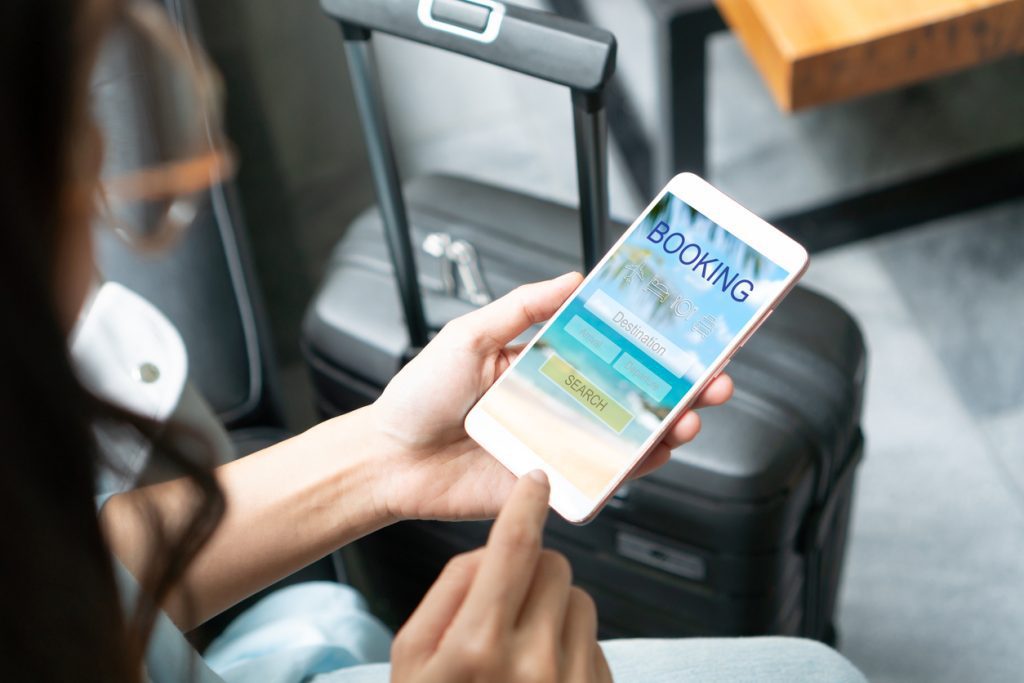Most of us are experts in downloading apps to access and manage everything from our energy account to our local cinema bookings. But have you heard of white-label apps? Did you know that many of the apps we use are simply generic templates that have been purchased and rebranded?
To understand further, consider a white T-shirt designed, manufactured, and sold by Company A. Company B buys the T-shirt, applies its own printing, labelling, and packaging, and sells it as its own. The same principle applies to white-label apps. White-label apps are built by one company, then rebranded and sold to another.
In the travel industry, where most bookings are now made online, it is essential to provide consumers with a good, user-friendly, app-based booking platform. Unsurprisingly, 83% of US adults book their trips online, and many do this on-the-go, using mobile apps. So it really is a crucial investment if a travel agent wants to generate clients and expand their business.
However, designing, developing, testing, and maintaining a booking app can be a significant drain on resources. A particular challenge within the travel industry is that booking apps must be real-time and able to reference availability and data from multiple suppliers quickly and accurately. A travel booking app is complex and expensive and can take months to develop and test.
Hence the popularity of white-label apps. These apps allow businesses to purchase a tried-and-tested product. They can personalize, rebrand, and tailor it to their own formula and bring it to market quickly.
Traveltek offers its own white-label solution for agents operating in the cruise market. Cruise Website Builder allows small travel operators and start-ups access to world-leading cruise line booking data. All that needs to be provided is the domain, branding, and logo, and an agent is ready to use the cruise booking engine, offering their customers a streamlined cruise booking experience.

What is a White Label Partnership?
If you’ve decided that purchasing a white-label app rather than developing your own from the ground is the next step for your business, you’ll want to choose wisely. There are an increasing number of options available, ranging from basic ‘off the shelf’ apps that allow rebranding and some customization to fully flexible, more bespoke apps.
White-label app partnerships are becoming a popular business model. They can be hugely successful in allowing companies to expand their business without the need for extensive development or resource. When considering entering into a white label agreement, whether it’s a digital app, service or manufactured product, it’s useful to consider some important points:
- Strategic alignment – The best partnerships are often those where both parties operate in a similar industry. A developer specializing in a related market will have experience of the associated consumer demands and challenges.
- Pricing – Cost is an essential part of the decision-making process. There will be upfront and ongoing costs to consider and compare. Complete visibility is essential, and most reputable developers will offer a clear breakdown of the costs involved.
- Scalability – Ensure that the app is suitable for now and the future as your business grows.
Is it Right for My Business?
Purchasing a white-label app may be an easy and cost-effective solution, but is it right for you? The level of customization may deter you from purchasing an off-the-shelf product, as you may struggle to differentiate your app from your competitors and maintain your brand identity.
If your business relies on a niche set of clientele that requires a particular vibe and method of accessing your products, you may find it more beneficial to build your own app. Complete flexibility, brand recognition and lack of control are some factors that may lead you to invest internally.
The Facts About White Label Apps
Outsourced maintenance and technical support – the app developer will often provide a level of maintenance and support at an agreed cost, taking the pressure off internal resources
- Speed – the pre-built app is virtually ready to go, allowing your product to be presented to market quickly versus the weeks or months it can take to build a bespoke product
- Flexibility – a basic white-label app can often be tailored to include branding and some customization, whereas a bespoke app offers a completely unique product with closer brand identity
- Low investment cost – an ‘off-the-shelf’ product is considerably cheaper as there is no need for the initial investment in software development and testing. A white-label app is typically around 1/10th of the cost of a bespoke software development project. Depending on the size and scope, the cost of a bespoke app can run into thousands or hundreds of thousands
- Deploy proven software – glitches, errors and the extra costs of updates and problem-solving can be avoided by purchasing an off-the-shelf app
- Improved customer engagement – customers will benefit from a streamlined, tried and tested app
To counter the advantages, there are sometimes problems associated with purchasing a generic app. The main difficulty is app stores such as Google Play and Apple iOS, improving their clone and spam security, meaning that white-label apps sometimes get rejected.
There are lots of advantages to purchasing a white-label app, but it’s not always the best choice. Consider your business and its connection with consumers, reliance on brand identity and the budget available.




